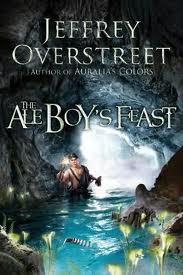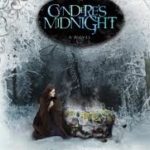The Ale Boy’s Feast: A Review
The journey began in Auralia’s Colors, when two crotchety old thieves outside House Abascar found a child lying in an enormous footprint. That child grew to be an artist, a reckless, loving girl who dared display the colours she saw to a kingdom in which colour was forbidden. Those colours captured the heart and fired the imagination of the king-to-be, Cal-Raven, and of a bloodthirsty beastman called Jordam. Likewise, they captivated a small boy with no name, a servant in the king’s house known only as the Ale Boy.
Then came the disaster, when House Abascar collapsed upon itself.
Auralia, most thought, died—but the vision she had shown transformed Jordam, drove Cal-Raven to seek a better home and future for his wandering people, and forever changed the Ale Boy.
Possessing only his gift of firewalking and his desire to love people for Auralia’s sake, the Ale Boy went into the ruins of House Abascar to rescue any he could find—and then further, into the hell-hole of House Cent Regus, from whence stems the curse that made beastmen, pulled down Abascar, and even now threatens to rip the world asunder.
The Auralia Thread is a beautiful, terrifying journey. It continues in Cyndere’s Midnight, when the heiress of the glamorous House Bel Amica embraces the mad vision of helping beastmen become human again, and in Raven’s Ladder, where Cal-Raven first glimpses the northern city of legend to which he hopes to lead his people—if they are not ensnared by the moon-spirit religion of Bel Amica’s Seers first. And it ends, at last, in The Ale Boy’s Feast, with a new beginning—the best possible ending for a story that is always calling us to come deeper, look farther, think harder, and above all, to see—
To see the truths that have always been there, before our eyes, hidden not by a malicious creator but by tricksters, by false stories, and by our own deceiving hearts. And to let those truths lead us home.
I loved The Ale Boy’s Feast. As the above plot summary indicates, it should not be read apart from the rest of the series—but read within its context, it’s a challenging, moving story that is both a heart-pounding adventure and a heartbreaking song. Jeffrey Overstreet’s writing has only gotten better, as even those characters who appear only for a few scenes are depicted with the detail that makes them human. His prose has all the density and mystery of poetry, demanding that readers pay attention. Not in any way a simplistic allegory, this book nevertheless offers us a lens through which to see ourselves, our world, our stories, and our history; a lens through which to cast aside deception and embrace beauty and truth.
I find myself at a loss, really, to sum up all I experienced as I read this book. I feel that I have read many different stories and could review them all, or I could just rise on a whirlwind of words, images, impressions—of glassworks, kites and kitemakers, golden ale, underground rivers, far northern mountains, toys, wings, love, death, nightmares, tears, men, women, and children. I close the covers and savour the names, the places, the accents, the people.
I can’t really do it all justice. The best I can do is encourage you to read this book, to read all four, and savour the feast with me.
A disclaimer, for parents and youngsters: This book, like the last three, is highly moral but not simplistically so. It includes violence that is scary and disturbing at times, and characters act like adults with adult temptations and sins (and blessings, for that matter).
—–
It just so happens that I have two copies of The Ale Boy’s Feast to give away to readers of this blog. Winners will be decided by draw, but you do have to do something to enter–leave a comment stating that you want to be entered and linking to a review (any review) that you’ve written and posted online in the last week. And yes, you can just write one up now and post it to be made eligible.
Next time, an interview with the author himself . . .









































I’d like to be entered. Alas, I don’t remember which books I’ve reviewed in the last week, so here’s my review of a well known book, Austen’s Mansfield Park, and yesterday’s blog post is a sort of fast review of an ebook and two movies, here.
I messed up the html–the blog post is here.
I just got Auralia’s Colors in the mail yesterday, based on favorable mention in this blog, so won’t be reading this fourth book real soon, even if I win, but I hope to read all of Overstreet’s books. My most recent review (Which Blogger decided to post already, in spite of it’s Blogger date) is here. It’s a review of a fantasy novel by Patricia A. McKillip.
Thanks for your blog!
I love those books, but already own them/
“I find myself at a loss, really, to sum up all I experienced as I read (wrote) this book.”
Rachel,
Your synopsis of Overstreet’s series, with its unique characters on their perilous journeys, reminded me of your own trilogy. I’m thinking that’s why you had such a connection to the story. I’m betting your styles are similar too. I’d recommend to anyone who likes this reading to read the Seventh World Trilogy as well.
Now if that’s not buttering the pan.
Wow, thanks! I’m honoured.
I should have mentioned, also: I will pick the winner on May 6, when my interview with Jeffrey posts here.
[…] Quoting from my review at Speculative Faith of The Ale Boy’s Feast (all of which, including a plot synopsis of the whole series, you can read here): […]